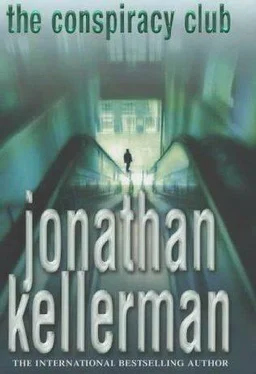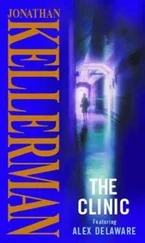He ordered a double scotch.
The old waiter who’d served them wasn’t on duty. The young man who brought his drink was bland-faced and cheerful and had a high-stepping, prancing walk that made Jeremy think of a racehorse straining at the bit.
“Any particular brand, sir?”
“Nope.”
Same room, same booth, but nothing was the same.
Jeremy sat there for a long time, stretching out his refills in an attempt to simulate self-control.
The young waiter was bored and took to reading the paper. Insipid music played in the background. By the time Jeremy finished his third scotch, his body was buzzing.
No sadder place than Sunday in a big-city hotel. This city prided itself on Midwestern wholesomeness, and Sunday was family day. Even the lobby was deserted, saurian salesmen departed to long-suffering wives, hotel hookers doing whatever working girls did on Sunday.
Sometimes they died.
Jeremy waved that away. Actually moved his hand to dispel the thought. No one was around to notice the ticlike gesture, and he repeated it. Amused, like a naughty kid who’d gotten away with something.
He called for still another drink, filled his blood with alcohol, drank himself rosy. On some level- a cutaneous level- it was a pleasant experience. But for the most part he felt detached.
Living in someone else’s skin.
On Monday he woke up mean and logy and stiff, and he wondered if he’d caught Angela’s flu.
A brisk walk in the chilled air burned his chest and woke him up and by the time he drove to work, he felt semicivilized. Stopping for coffee in the dining room, he spotted Ted Dirgrove and another white-coat engaged in what looked like tense conversation. The same swarthy, mustachioed man who’d sat with the surgeon the first time Jeremy had noticed him. The two of them, and the cardiologist, Mandel.
No reason to notice them now, because the room was filled with white-coats, and Dirgrove and his companion were off in a far corner. But something about the heart surgeon… Angela’s enthrallment with what Dirgrove did…
He was jealous.
He filled a cup, headed out of the room. Dirgrove and the other man hadn’t budged. Their discussion looked tense- something academic? No, this seemed personal. Their body postures were those of two dogs facing off.
Then Dirgrove smiled, and so did the other man.
Two dogs with their teeth bared.
Even match. The other doctor was Dirgrove’s height, had a similar, slender build, and, like Dirgrove, his hair was close-cropped. But this curly cap was as dark as his mustache.
The dark man talked with his hands. Offered a parting shot and exited the dining room. Dirgrove stood there alone, his hands clenched. That cheered Jeremy, and he decided he was hungry and went back for a sweet roll.
He decided to sit down to eat. Dirgrove left. A few moments later, Angela appeared, in a group of residents.
Chattering, happy, hyperactive. All of them, looking so young.
She’d talked about feeling worn-out, but now she was the essence of vitality.
All of them were. Kids.
Suddenly, the eight years between Angela and Jeremy seemed a generation. Jocelyn had been Angela’s age, but she’d seemed more… seasoned. Maybe it was the years she’d put in as a nurse. Or the grunt jobs she’d worked to put herself through nursing school.
Angela, anxious and driven despite a happy childhood, her father’s princess, might never get past the guilt of being wellborn.
Jocelyn’s family was trailer-park poor, and she’d been on her own since adolescence. She’d appreciated everything.
A working girl.
No. That sounded so wrong.
Tears filled Jeremy’s eyes. He put his roll and his coffee aside, hurried out, careful to escape Angela’s notice.
The fourth envelope arrived. Finally.
Tuesday morning, stuck in the middle of a stack of ignorables. Jeremy had taken to cruising by the Psychiatry Office or sticking his head out of his door at random moments in hope of coming upon the anonymous mailer.
To no avail. And it really didn’t matter, did it? The medium was the message.
Thin envelope- thinner than usual. Inside was a single slip of paper upon which was typed a single line:
Ethics of the Fathers, Sforno, 5:8e
Obviously some kind of reference. An ancient text? Something Buddhist? Italian?
He got on the computer and had his answer within moments.
Religious but not Buddhist. Ethics of the Fathers was a volume- a “tractate”- from the Jewish Talmud, the only one of sixty-three that didn’t deal primarily with laws.
“The Bartlett’s of Judaism,” one authority called it.
“A compendium of morality,” opined another.
“Sforno” was Ovadiah Sforno, an Italian rabbi and physician who’d lived during the Renaissance and was primarily known for his commentary on the Bible.
He’d also written a lesser-known companion to Ethics of the Fathers .
Where would you find something like that?
Maybe at Renfrew’s, back when the mute man had been alive.
He called two city libraries. Neither carried the book in any edition. Pulling out the phone book, he looked up bookstores in the yellow pages.
He tried several sellers of new books and antiquarian tomes. None of the proprietors had any idea what he was talking about. A couple of stores advertised themselves as “religious booksellers,” but “religious” turned out to be Catholic and Lutheran, respectively.
The owner of the Catholic bookstore said, “You might try Kaplan’s.”
“Where’s that?”
“Fairfield Avenue.”
“Fairfield, east of downtown?”
“That’s it,” said the man. “What used to be the Jewish neighborhood before they all moved out to the suburbs.”
“Kaplan’s still there?”
“Last I heard.”
Fairfield Avenue was a brief, drizzly ride from the hospital, two lanes of sinuous, potholed asphalt crowded with soot-blackened, prewar buildings. Nearly all the storefronts had been bricked over, and the once-commercial avenue was mostly U-rent storage facilities. Faded signs painted on grimy walls hinted at a previous life:
SCHIMMEL’S PICKLES
SHAPIRO’S FISH MARKET
KOSHER BUTCHER
The bookstore was ten feet wide, with flaking gold lettering that read BOOKS, GIFTS AND JUDAICA above what Jeremy assumed was the same legend in Hebrew. The glass was dark- not blackened like Renfrew’s but dimmed by what appeared to be unlit space.
Closed. The last holdout, folding.
But when Jeremy turned the brass doorknob, it relented, and he stepped into a tiny, dim room. No overhead lights; an amber-shaded, copper-based lamp cast a cone of illumination on a battered, oak desk. The room should’ve smelled musty but didn’t.
Behind the desk sat a man, elderly, clean-shaven, wearing a black suede skullcap over a head of bluntly cut gray hair. An old man but a big man, undiminished by time. Wide-shouldered and heavy-boned, he sat with military posture, wore a white shirt and dark tie and braided leather braces. Gold-framed half glasses rested on a thin, slender nose. Behind him was a glass case filled with a mix of objects: silver cups and candelabras, record albums festooned with Stars of David (Uncle Shimmy Sings the Zemiros), children’s games, what appeared to be plastic spinning tops, velvet bags embroidered with more six-pointed stars. Below all that, three shelves of books.
The man was tinkering with a black leather box attached to a series of matching straps and looked up. “Yes?”
“Do you have Rabbi Sforno’s commentary on Ethics of the Fathers ?”
The man studied him. “You can get it over the Internet.”
Читать дальше












